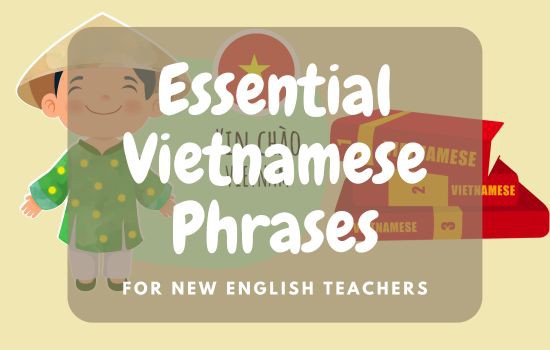Essential Vietnamese Phrases for New English Teachers
Embarking on a TEFL adventure in Vietnam is an exciting prospect. Immersing yourself in a new culture while teaching English offers a rewarding experience filled with personal and professional growth. However, navigating daily life and classroom interactions in a new language can be daunting at first.
This comprehensive guide equips you with essential Vietnamese phrases for new English teachers. By learning these key expressions, you'll feel more confident communicating with your students, colleagues, and locals, making your transition to life in Vietnam smoother and more enjoyable.
Greetings and Introductions:
- Xin chào (Xin chao): Hello (Formal)
- Chào bạn (Chao Ban): Hello (Informal)
- Tên tôi là [Your Name] (Ten toi la [Your Name]): My name is [Your Name]
- Rất vui được gặp bạn (Rat vui duoc gap ban): Nice to meet you
- Cảm ơn (Cam on): Thank you
- Không sao (Khong sao): You're welcome
- Xin lỗi (Xin loi): Excuse me (Can I get your attention)
Classroom Management:
- Ngồi xuống (Ngoi xuong): Sit down
- Dừng lại (Dung lai): Stop
- Im lặng (Im lang): Be quiet
- Xin hãy lặp lại (Xin hay lap lai): Please repeat
- Bạn hiểu không? (Ban hieu khong?): Do you understand?
- Tuyệt vời! (Tuyet voi!): Great!
- Một lần nữa (Mot lan nua): One more time
- Xin vui lòng mở sách vở của bạn (Xin vui long mo sach vo cua ban): Please open your books
Asking Questions:
- Bạn có thể nói chậm hơn không? (Ban co the noi cham hon khong?): Can you speak slower?
- Từ này nghĩa là gì? (Tu nay nghia la gi?): What does this word mean?
- Làm thế nào để...? (Lam the nao de...?): How do I...?
- Bạn có thể giúp tôi không? (Ban co the giup toi khong?): Can you help me?
Basic Needs:
- Tôi có thể đi vệ sinh được không? (Toi co the di ve sinh duoc khong?): Can I go to the bathroom?
- Tôi khát nước (Toi khat nuoc): I'm thirsty
- Tôi đói (Toi doi): I'm hungry
- Xin lỗi, tôi không khỏe (Xin loi, toi khong khoe): Excuse me, I'm not feeling well
Numbers (1-10):
- Một (Mot): One
- Hai (Hai): Two
- Ba (Ba): Three
- Bốn (Bon): Four
- Năm (Nam): Five
- Sáu (Sau): Six
- Bảy (Bay): Seven
- Tám (Tam): Eight
- Chín (Chin): Nine
- Mười (Muoi): Ten
Days of the Week:
- Thứ Hai (Thu Hai): Monday
- Thứ Ba (Thu Ba): Tuesday
- Thứ Tư (Thu Tu): Wednesday
- Thứ Năm (Thu Nam): Thursday
- Thứ Sáu (Thu Sau): Friday
- Thứ Bảy (Thu Bay): Saturday
- Chủ Nhật (Chu Nhat): Sunday
Transportation:
- Đi taxi (Di taxi): Take a taxi
- Bến xe buýt (Ben xe buyt): Bus stop
- Ga tàu hỏa (Ga tau hoa): Train station
Shopping:
- Bao nhiêu tiền? (Bao nhieu tien?): How much?
- Tôi muốn mua... (Toi muon mua...): I would like to buy...
- Quá đắt (Qua dat): Too expensive
Courtesy:
- Cám ơn nhiều (Cam on nhieu): Thank you very much
- Xin lỗi (Xin loi): Excuse me (Sorry)
- Không có gì (Khong co gi): You're welcome (It's nothing)
Additional Tips:
- Pronunciation: While mastering perfect Vietnamese pronunciation takes time, focus on getting the basic sounds right. Listen to native speakers and practice saying the phrases aloud.
- Body Language: Combine your phrases with appropriate body language. A smile goes a long way in conveying friendliness and respect.
- Learning Resources: Utilize online resources and apps like Duolingo, Memrise, or VietnamesePod101 to further enhance your Vietnamese language skills.
- Don't be afraid to make mistakes: Embrace the learning process! Most Vietnamese people will appreciate your effort to communicate in their language and be happy to help you improve.
- Carry a Phrasebook: Having a pocket-sized Vietnamese phrasebook can be a lifesaver in situations where you need to express yourself beyond the basic phrases you've learned.
- Learn Common Greetings in Different Regions: Vietnamese dialects can vary slightly across regions. While the phrases listed above are widely understood, consider learning some basic greetings specific to the area you'll be teaching in.
Going Beyond the Basics:
Learning these essential Vietnamese phrases is a solid foundation for your communication needs in Vietnam. As you get more comfortable with the language, consider expanding your vocabulary to include:
- Phrases related to your specific teaching subject: This will enhance your communication with students and demonstrate your dedication to their learning.
- Basic questions about Vietnamese culture: Show your interest in learning about local customs and traditions.
- Simple compliments: A polite compliment can brighten someone's day and build rapport.
Embrace the Journey:
Learning Vietnamese is an enriching experience that will deepen your connection with Vietnam and its people. By putting in the effort to learn even these basic phrases, you'll demonstrate your respect for the culture and set yourself up for a more rewarding adventure as an English teacher in Vietnam. Remember, the Vietnamese people appreciate your willingness to learn their language, and a simple "Xin chào" can go a long way in building positive relationships.
We wish you all the best in your TEFL journey in Vietnam!


